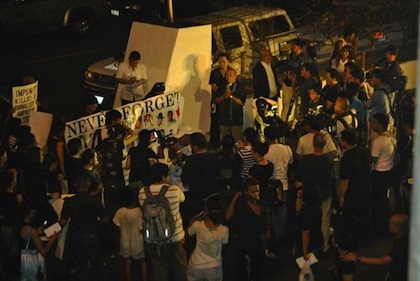SUMMARY
This is AI generated summarization, which may have errors. For context, always refer to the full article.

MANILA, Philippines – Holding people accountable for the crimes they committed has never been harder than in cases of extrajudicial killings in the Philippines.
Despite tireless efforts of victims’ families and their supporters, only 4 cases of politically-motivated murders have been successfully prosecuted in the country over the last 4 years.
In an interview, Elaine Pearson, deputy director of the Human Rights Watch Asia Division, explained how the lack of political will on the part of the Aquino administration mirrors a low priority it accords to human rights.
Upon his assumption of office, Aquino inherited an estimated 150 cases of extrajudicial killings from the Arroyo administration. A Philippine human rights watchdog, Karapatan, pegs this number at 1,200.
None of the perpetrators, however, has been convicted under Aquino’s leadership.
“While Aquino’s language has been strong, he has not implemented the systemic reforms necessary to stop the killings and hold perpetrators accountable,” a report from New York-based Human Rights Watch says.
Deflection
Although the number of killings has gone down, human rights advocates are not impressed by the progression of retribution thus far.
In the latest issue of Karapatan Monitor, the group stressed Aquino’s failure “to render justice to the victims of human rights violations (HRV) under the US-Arroyo regime.”
A report prepared by the Presidential Human Rights Committee Secretariat, with the assistance of the Department of Foreign Affairs (DFA) and the Department of Justice (DOJ), records a number of task forces and human rights monitoring teams set up under the Aquino administration. These teams supposedly involve the participation by the military.
Still, Pearson said these task forces deflect from the issue of justice and prosecution which should be the top priority of the administration right now.
Among the greatest hurdles in the effective prosecution of extrajudicial killings and enforced disappearances in the country are the military’s failure to cooperate in investigations and the limitations of the Philippine criminal justice system, Pearson added.
Even if convicted, military members are held in military camps which are far from the equivalent of life in prison cells.
Pearson said the absence of clear directives from the President to government institutions like the military is one indication of lack of political will.
“We simply haven’t seen that strong statement coming from the top,” she said.
Protection of those left behind
According to Jose Manuel Diokno of the Free Legal Assistance Group (FLAG), the failure to protect witnesses is a major impediment in the delivery of justice.
An expedient judicial process is inhibited because possible witnesses fear for their lives. This is especially so in political killings where the perpetrator is usually a person with power and position.
The Maguindanao Massacre of 2009 is one such case. “We know that this is not an isolated case,” said Pearson.
The massacre – which resulted in more than 50 civilians killed by a hundred armed men – also brought the country’s human rights condition under close scrutiny.
In a separate report, Human Rights Watch called on the President to issue an executive order banning all paramilitary and militia forces.
The problem of extrajudicial killings
In 2011 alone, there have been 10 documented cases of killings and disappearances attributed to security forces. Not one has been effectively tried in a civilian court.
The latest report released last July 2011 by the Human Rights Watch concluded that prompt action in investigation and prosecution are needed in view of the recorded killings perpetrated by alleged members of the state military.
Furthermore, there is a need to delineate combatants from civilian activists.
“The military still fails – both in its words and actions – to differentiate between the armed NPA (New People’s Army) and NGOs and political parties that may espouse some elements of communist or other leftist ideology,” the report reads.
Universal Periodic Review (UPR)
On May 29, all eyes will be on the Philippines as the United Nations Human Rights Council (UNHRC) convenes in Geneva to conduct its Universal Periodic Review (UPR) of the country.
The council will assess the progress of the Philippine government based on previous recommendations and will hold it accountable for commitments made. UN member states may also issue specific, time-bound recommendations.
A livestream of the discussion will be held at the Commission on Human Rights office while a simultaneous webcast can be viewed at the United Nations multimedia website (http://www.unmultimedia.org/tv/webcast/c/un-human-rights-council.html) from 3 to 6:30 pm, Manila Time.
The UPR is held every 4 years during which the human rights record of a country is put under the spotlight. This is the second time that the Philippines will be reviewed. – Rappler.com
Add a comment
How does this make you feel?
There are no comments yet. Add your comment to start the conversation.